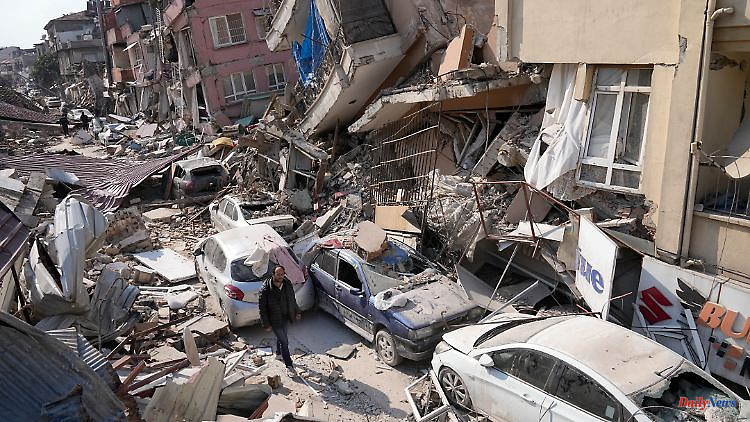With more than 25,000 officially confirmed dead, the death toll from the earthquakes in Turkey and Syria has passed the next threshold. The forces assume thousands more bodies that are still buried under the rubble. But the situation is also dramatic for the survivors.
In the earthquake area in Turkey and Syria, the rescuers are recovering hundreds of new victims, but isolated people are still alive from the rubble - almost a week after the disaster. At the same time, the threshold of 25,000 officially confirmed dead was exceeded. But the chances of survival are dwindling. Normally, a person can go a maximum of 72 hours without water. Added to this are the cool temperatures.
The rescuers are also concerned about another aspect: is safety still guaranteed? "There is increasing aggression between groups in Turkey. Shots are said to have been fired," said Lieutenant Colonel Pierre Kugelweis from the Austrian Armed Forces of the APA news agency. After a break, the soldiers continued their work. The Turkish army took over the protection of the unit.
Many survivors are traumatized and mourn the loss of family members. I.S.A.R operations manager Steven Bayer said: "It can be seen that the sadness is slowly giving way to anger." Tamara Schwarz, spokeswoman for the THW headquarters in Bonn, spoke of "tumultuous scenes". The protection of the volunteers is now a priority. However, the teams stayed put. THW and I.S.A.R further stated: "The reason for this seems to be, among other things, the shortage of food and the difficult water supply in the earthquake area."
So far, more than 25,400 people have died in the Syrian-Turkish border area. At least 21,848 died in Turkey alone, and more than 3,553 in Syria. More than 85,000 people were also injured in the two countries. Thousands more are feared to die from the collapsed buildings.
A 7.7 magnitude tremor shook the border area early Monday morning, followed by another 7.6 magnitude tremor at noon. Since then, there have been more than 2,000 aftershocks in the region, according to the Turkish civil protection agency Afad. According to Turkish President Recep Tayyip Erdogan, more than 1.5 million are now sheltering in tents or public emergency shelters or hotels. With the support of international aid teams, mountains of rubble have been removed since Monday. Sniffer dogs are on duty.
The rescuers hope that people will always be found alive. In the Turkish city of Kahramanmaras, a nine-year-old boy named Ridban was rescued after around 120 hours in a collapsed house, the Israeli army said. In the city of Adiyaman, a couple was rescued after 129 hours. However, it probably has to mourn the death of its three daughters, as reported by the Turkish state television station TRT World. A two-month-old baby was rescued after 128 hours in Hatay province, state-run Anadolu News Agency reported. People continued to ask for help quickly on social media and television reports, saying they still heard voices under the rubble.
The search teams have recently found no more survivors in Aleppo. Information from the Syrian area is still sparse. "We stay overnight on this sidewalk and light firewood," said Abdu al-Sus. He built an improvised tent out of fabric for his wife and five children. A number of other families also spend the night on the streets or in cars in the particularly affected east of the city in freezing temperatures.
According to the World Health Organization, aid must be significantly expanded. "We need to act with more urgency, on a larger scale, and to organize better," said Richard Brennan, WHO emergency relief director for the Eastern Mediterranean region in Aleppo. The number of dead and injured is immense, but what is often neglected is the large number of homeless people. In Aleppo alone, in the government-controlled part of northwestern Syria, around 200,000 people have lost their roofs, according to initial estimates.
The concern is great worldwide. In Germany, the Bundesliga clubs commemorated the victims with a minute's silence before kick-off. Bangladesh sent humanitarian and medical aid to earthquake victims in Syria. WHO chief Tedros Adhanom Ghebreyesus also arrived in Syria on .
According to the Governing Mayor Franziska Giffey, Berlin wants to set up an airlift for the transport of relief supplies. "And with many who donated, we succeeded (...) in building an airlift from Berlin to Turkey, also in cooperation with the Turkish embassy, with the consulate general," said the SPD politician at a commemoration the earthquake victims at the Brandenburg Gate. Federal Minister of Agriculture Cem Özdemir spoke again in favor of rapid entry simplifications so that those affected by the earthquake can come to Germany to see relatives. The federal government had promised a "pragmatic solution" for issuing visas to survivors of the earthquake disaster.












